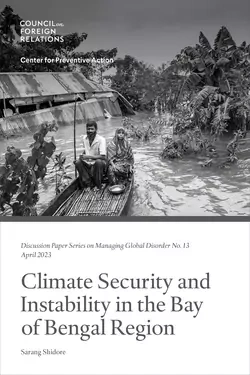
Climate Security and Instability in the Bay of Bengal Region

The countries on the Bay of Bengal already face some of the world’s most severe natural disasters, and climate change will likely make things worse. Sarang Shidore argues the United States should partner with regional organizations to increase mitigation efforts.
- Report
The Bay of Bengal region—comprising coastal Bangladesh, India, Myanmar, and Thailand—is extremely vulnerable to climate change, with each of the four countries ranked in the top ten most vulnerable globally. Political stability is also tenuous. Myanmar and Thailand are both controlled by military governments; the United States, China, and India view the region as an arena for competition; and Myanmar’s ongoing civil war threatens to spill over the country’s borders with Bangladesh and Thailand. In order to prepare for and mitigate the potentially destabilizing effects of climate change, the Quincy Institute’s Sarang Shidore argues that policymakers in Washington need a greater understanding of the most plausible scenarios for climate change and conflict in the region.
The Bay of Bengal region faces many of the world’s deadliest cyclones, and warmer temperatures will enable storms to hold more moisture and cause more damage. Rainfall variability and rising sea levels contribute to routine flooding, which is especially dangerous for coastal communities. Major, densely populated coastal cities such as Chennai, India; Kolkata, India; Dhaka, Bangladesh; Yangon, Myanmar; and Bangkok, Thailand, are at risk. On the other hand, increasing temperatures are already contributing to drought conditions and soil deterioration that put food security at risk in rice-growing regions. While climate-related migration has yet to largely materialize, worsening conditions could prompt mass movements of people that would inflame border tensions.
According to Shidore, policymakers in the United States “should emphasize cooperative policy approaches to improve resilience, disaster relief capacities, and preventive climate security diplomacy with regional institutions and states.”
More on:
If climate conditions continue to worsen, four scenarios appear most likely. A further deterioration of Myanmar’s political and ecological situation could prompt mass emigration and destabilize the region. Stalled economic growth and increased domestic division in Bangladesh resulting from increasing natural disasters could threaten a similar emigration crisis. More optimistically, the third scenario would see the region become more resilient to climate change, potentially under Bangladeshi leadership. The final scenario entails greater isolationism and heightened tensions between all of the littoral states.
Any positive outcome depends on international cooperation. “Of the bigger states, the role of the United States is crucial in many of these, as will be the contributions of China and India,” notes Shidore. “Regional, interregional, and international cooperation is essential to generate solutions. Such cooperation needs to be pursued. There is no time to lose.”
This is the thirteenth Discussion Paper in the Managing Global Disorder series, which explores how to promote a stable and mutually beneficial relationship among the major powers that can in turn provide the essential foundation for greater cooperation on pressing global and regional challenges.
This Discussion Paper was made possible by a grant from the Carnegie Corporation of New York. The statements made and views expressed are solely the responsibility of the author.
Professors: To request an exam copy, contact [email protected]. Please include your university and course name.
More on:
 Online Store
Online Store